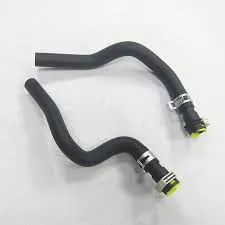High-Performance Gas Fuel Line Hose for Reliable Engine Performance
Oct . 08, 2024 18:45 Back to list
High-Performance Gas Fuel Line Hose for Reliable Engine Performance
Understanding Gas Fuel Line Hose Essential Components for Efficient Fuel Delivery
When it comes to ensuring the reliable performance of internal combustion engines, one often overlooked component is the gas fuel line hose. These hoses are pivotal in the transportation of fuel from the tank to the engine, and their quality, durability, and proper installation are paramount for vehicle safety and efficiency.
What is a Gas Fuel Line Hose?
A gas fuel line hose is a flexible tube made to convey fuel between different parts of an engine. Typically crafted from rubber or synthetic materials, these hoses are designed to withstand pressure, extreme temperatures, and the corrosive nature of gasoline. They come in various sizes and configurations to accommodate different engine designs and fuel systems.
The Importance of High-Quality Fuel Hoses
Using high-quality gas fuel line hoses is crucial for several reasons. Firstly, they play a significant role in maintaining the integrity of the fuel system. A compromised hose can lead to fuel leaks, which not only poses a fire hazard but can also decrease the overall efficiency of the engine. Secondly, poor-quality hoses can degrade over time, leading to blockages that can cause engine performance issues.
Signs of Wear and Tear
As with any component, gas fuel line hoses are subject to wear and tear. Vehicle owners should be vigilant for signs that their fuel lines may need replacing. Common indicators include visible cracks or abrasions on the hose, a strong smell of gasoline, or the presence of fuel stains beneath the vehicle. Additionally, if the engine experiences difficulty starting or if it frequently stalls, these could be symptoms related to fuel delivery issues stemming from damaged hoses.
gas fuel line hose

Choosing the Right Hose
When it comes to replacing a gas fuel line hose, it is essential to choose the right type for your vehicle. Different engines may require specific hose materials and sizes, and it is crucial to refer to the manufacturer's specifications. Many automotive stores offer a variety of hoses, including those that meet industry standards for fuel resistance and durability.
For those venturing into a DIY replacement, it is essential to take the necessary precautions. Always ensure the fuel system is depressurized before attempting any work, as handling gasoline poses significant risks. Wearing gloves and safety glasses can protect against accidental spills and splashes.
Maintenance Tips
To prolong the life of your gas fuel line hoses, regular inspections and maintenance are key. Every few months, visually check the hoses for any signs of damage or wear. Additionally, ensure that the connections are tight and that there are no signs of leaks. Keeping the fuel system clean can also help prevent issues. Periodically changing the fuel filter can reduce the amount of debris and contaminants that may otherwise damage the hoses over time.
Conclusion
Gas fuel line hoses serve a critical function in any vehicle equipped with an internal combustion engine. Understanding their importance, recognizing the signs of wear, and ensuring the use of quality materials can help maintain optimal engine performance. Whether you are a seasoned mechanic or an everyday driver, being informed about the condition of your gas fuel line hoses is an integral part of vehicle maintenance. Always remember, when it comes to fuel delivery systems, a small oversight can lead to significant consequences.
